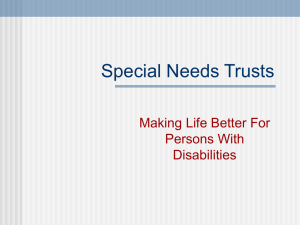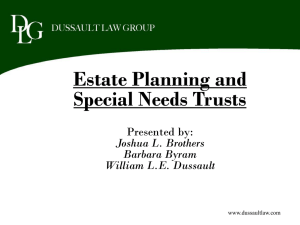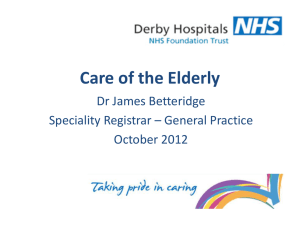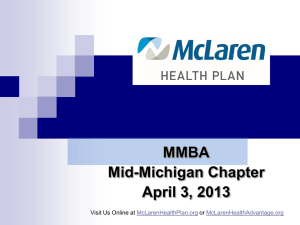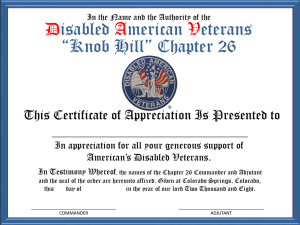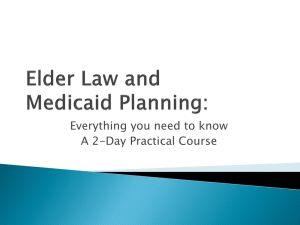How simple is it to join the AGED Pooled Trust?
advertisement
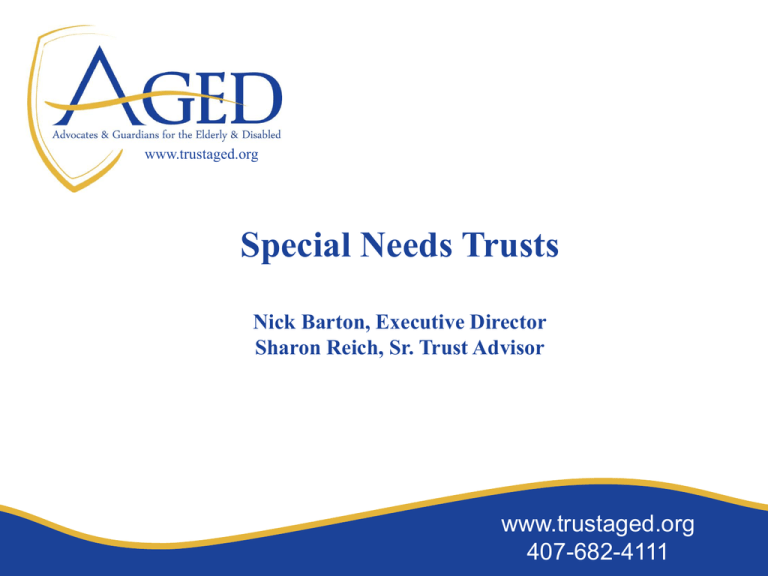
www.trustaged.org Special Needs Trusts Nick Barton, Executive Director Sharon Reich, Sr. Trust Advisor www.trustaged.org 407-682-4111 Types of Special Needs Trusts d(4)(A) under 65 d(4)(B) Miller d(4)(c) Pooled Third Party Contains Income or Assets Income Only Income or Assets Asset Only Established By Parent, grandparent, legal guardian, or the court Not Stated Parent, grandparent, legal guardian, the court, or the individual Other than Beneficiary Managed By Trustee: Individual, Corporate, or Non-Profit Trustee: Individual, Corporate, or Non-Profit Trustee: Non-Profit Trustee: Individual, Corporate, or Non-Profit Used to Pay The benefit of: Stated in Trust Documents The benefit of: Medical only Sole benefit of: Almost anything that is not paid for by other government benefits The benefit of: Stated in Trust Documents AGE Under 65 Any Any Any How Much Can Go In Unlimited Unlimited: Income Only Unlimited Unlimited: Asset Only Upon Death Pays back Medicaid first; to heirs, or as stated in Trust Documents Pays back Medicaid first; to heirs, or as stated in Trust Documents Retained by Trust: Supports Community Not Retained by Trust: Pays back Medicaid, then to heirs No pay back to Medicaid; to heirs or as stated in Trust Documents www.trustaged.org www.trustaged.org 407-682-4111 Federal Code, Social Security POMS and State of Florida Medicaid Guidelines as they relate to the AGED d(4)(c) Pooled Trust Federal Code -42 USC Sec. 1396p (d)(4): (C) A trust containing the assets of an individual who is disabled (as defined in section 1382c(a)(3) of this title) that meets the following conditions: i. The trust is established and managed by a non-profit association. ii. A separate account is maintained for each beneficiary of the trust, but for purposes of investment and management of funds, the trust pools these accounts. iii. Accounts in the trust are established solely for the benefit of individuals who are disabled (as defined in section 1382c(a)(3) of this title) by they parent, grandparent, or legal guardian of such individuals, by such individuals, or by a court. iv. TO the extent that amounts remaining in the beneficiary’s account upon the death of the beneficiary are not retained by the trust, the trust pays to the State from such remaining amounts in the account an amount equal to the total amount of medical assistance paid on behalf of the beneficiary under the State plan under this subchapter. E. Definitions: In this section, the following definitions shall apply: (1) The term “assets”, with respect to an individual, includes all income and resources of the individual and of the individual’s spouse, including any income or resources which the individual or such individual’s spouse is entitled to but does not receive because of action Qualified Medicaid Trust Guidelines and Forms Florida DCF A-22 The qualified Medicaid pooled trust for disabled individuals is a legal instrument which meets criteria in 42 United States Code 1396 (p)(d)(4)(c) and which allows disabled individuals to place assets and / or income into a trust to qualify for Medicaid assistance. (Refer to manual policy in Chapter 1640.) http://www.dcf.state.fl.us/publications/esspolicymanual/index.shtml Social Security –SI 01120.203 Exceptions to Counting Trusts Established on or after 1/1/00 2. Pooled Trusts Established under Section 1917 (d)(4)(C) of the Act a. General A pooled trust is a trust established and administered by an organization. It is sometimes called a “master trust” because it contains the assets of many different individuals, each in separate accounts established by individuals, and each with a beneficiary. By analogy, the pooled trust is like a bank that holds the assets of individual accountholders. Whenever you are evaluating the trust, it is important to distinguish between the master trust, which is established by the nonprofit association, and the individual trust accounts within the master trust, which are established by the individual or another person for the individual. The provisions of the SSI trust statute do not apply to a trust containing the assets of a disabled individual which meets the following conditions: • The pooled trust is established and maintained by a nonprofit association; • Separate accounts are maintained for each beneficiary, but assets are pooled for investing and management purposes; • Accounts are established solely for the benefit of the disabled individual; • The account in trust is established by the individual, a parent, grandparent, legal guardian, or a court; and • The trust provides that to the extent any amounts remaining in the beneficiary’s account upon the death of the beneficiary are not retained by the trust, the trust will pay to the State the amount remaining up to an amount equal to the total amount of medical assistance paid on behalf of the beneficiary under a State Medicaid Plan. Note: There is no age restriction under this exception. www.trustaged.org 407-682-4111 Social Security Disability www.trustaged.org Social Security’s 5 Steps of Disability Step 1: Is the claimant engaging in substantial gainful activity now? If yes, claimant is not disabled. If no, proceed to step 2. Step 2: Does the claimant have a non-severe (incredibly minor) medical impairment? If yes, claimant is not disabled. If no, proceed to step 3. Step 3: Does the claimant have a medical condition so severe that it is found in the Listing of Impairments for automatic payments of benefits without further inquiry? If yes, pay the benefits. If no, proceed to step 4. Step 4: Can the claimant return to any type of work that claimant has done in the past 15 years? If yes, deny claim. If no, proceed to step 5. Step 5: Given the claimant’s Residual Functional Capacity, and considering the claimant’s age, education, prior work experience and transferable skills, is there any alternative work that the claimant can do on a full time basis? If yes, deny claim. If no, pay the benefits. “To clarify SSA’s standards and procedures for the adjudication of titles II and XVI of the Social Security Act (the Act) disability and blindness claims for individuals aged 65 or older. In particular, this Ruling explains that: In general, the regulations and procedures for determining disability for adults who are under age 65 are used when determining whether an individual aged 65 or older is disabled. Adjudicators are required to consider any impairment(s) the individual has, including those that are often found in older individuals. If an individual aged 72 or older has a medically determinable impairment, that impairment will be considered to be “severe.” If the individual’s impairment(s) prevents the performance of his or her past relevant work (PRW), or if the individual does not have PRW, the adjudicator must consider two special medical vocational profiles showing an inability to make an adjustment to other work before referring to appendix 2 to subpart P or 20 CFR part 404. Generally, adjudicators should use the rules for individuals aged 60-64 when determining whether an individual aged 65 or older can adjust to other work. Some individuals aged 65 or older may not understand, or be able to comply with, our requests to submit evidence or attend a consultative examination (CE). Therefore, adjudicators must make special efforts in situations in which it appears that an individual aged 65 or older may not be cooperating.” www.trustaged.org 407-682-4111 www.trustaged.org 407-682-4111 www.trustaged.org How can we help a senior or disabled person? • Preserve and protect assets and income for present and future needs • Extend their ability to stay in the community • Medicare B Premium paid back in Social Security check • Medicare D Premium covered by Medicaid or reduced • Medications reduced to $2.60 to $6.50 per medicine, per month • No Medicaid Spend Down • Exempt from Medicaid 5 year look back • No Medicare D Gaps or Donut holes – ability to choose • Reduced Patient Responsibility to Skilled Nursing Facility (responsibility becomes income minus personal needs allowance) www.trustaged.org 407-682-4111 www.trustaged.org What do you get with SSI (Medicaid) related Programs? Supplemental Security Income (SSI): Trust allows over assets to accumulate and not disqualify for benefits. MEDS-AD Program: Entitles certain aged or determine to be disabled individuals to receive full Medicaid Coverage Qualified Medicare Beneficiary (QMB) at Home Medicare B Premiums paid back in Social Security Check Medicare D Premiums reduced or covered by Medicaid Medication costs approximately $2.60 to $6.50 each No Medicare D Gaps or Donut holes In a Skilled Nursing Facility Patient Responsibility is Income minus $35.00 for Room and Board Most if not all Medication and Supplies are paid for At Home with Waiver (QMB Benefits Plus) Emergency Response System Eye Glasses Dental (Limited) Adult Day Care Care Management Home Health Care Consumable Medical Supplies Delivered Meals In an Assisted Living Facility with Waiver Medicaid pays approximately $1,300 towards ALF bill *depending on program Medicare B & D Premiums reduced or paid Medications costs approximately $2.60 – $6.50 each Care Management Eye Glasses Consumable Medical Supplies Dental (Limited) And more www.trustaged.org 407-682-4111 www.trustaged.org Under income or asset Over income or asset Rent, Mortgage, Facility AGED Trust Your bank Utilities Other bills as needed www.trustaged.org 407-682-4111 www.trustaged.org • • • • • • • Payments to Third Parties for the Sole Benefit of Long Term Care Insurance premiums Rehabilitation Out of pocket Medical and Dental expenses not covered by government benefits Transportation (including purchase of a vehicle) Personal care attendant for needs or escort to appointments or events Maintenance of items used to support the Beneficiary (house, vehicle, etc.…) Legal, Guardianship and Care Management services • Private Health Insurance • Trips/visits to family • Purchase of goods and services that add quality of life (furniture, television, entertainment, pet needs...) • Essential dietary needs (vitamins, supplements, etc…) • Food and shelter (rent, mortgage, water, sewage, electric, cable… )* *Special requirements for d4(a) trusts and SSI recipients. Requirement: Funds should not go directly to the Beneficiary and must be for the Beneficiary's support and needs. www.trustaged.org 407-682-4111 www.trustaged.org Final Distribution Options in an AGED pooled trust 100% Retained by AGED as surplus trust property for the following uses: • For the direct or indirect benefit of other Beneficiaries as defined in 42 U.S.C. §1382c(a)(3) • Add disabled persons to the Trust as Beneficiaries; • To provide disabled persons with equipment, medication or such other services deemed suitable for such persons by the Trustee; • To provide disabled persons with professional guardianship services. OR 10% Retained by AGED as surplus trust property Pays back Medicaid, then To heirs or as stated in the Trust documents www.trustaged.org 407-682-4111 www.trustaged.org How simple is it to join the AGED Pooled Trust? 1. Complete the Joinder and Fee Agreements, have documents notarized, and then send to AGED. Documents can be found on our website. 2. Provide a copy of Proof of Identification. 3. Fund the Trust. 4. AGED will sign and notarize the Joinder and Fee Agreements, and will send copies back to you for your records. 5. Provide a copy of all of the above, and the Master Trust (available on our website) to Medicaid. Join the AGED Pooled Trust in 5 easy steps! www.trustaged.org 407-682-4111 www.trustaged.org Examples of asset allocation models www.trustaged.org 407-682-4111 www.trustaged.org Which trustee to use? Questions to ask •Will my client’s money be ‘pooled’ with other client accounts? •How often will I get statements? •Do statements come from the trustee or the institution? •Fees – how much, and when are they taken? •Final distribution options – is there an option to payback heirs? •What do they do with ‘retained funds’? www.trustaged.org 407-682-4111 Guardian Benevolent Fund www.trustaged.org •Payments to Guardians and Attorneys for services provided to indigent guardianship clients •Guardians - Maximum compensation: 10 hours per month, at $35.00 per hour. •Attorneys - Maximum compensation: 12 hours per year, at a maximum rate of $80.00 per hour. • Funding is County specific • Application and Disbursement forms found at www.trustaged.org www.trustaged.org 407-682-4111 www.trustaged.org Veterans Benefits Aid and Attendance •For veteran, widowed spouse, and dependent of disabled child •Ninety days active duty with one day during wartime (different timeframe if enlisted after Sept 7, 1980) •Limited household assets (no set cap – appox. 50K to 80K) •Medical expenses close to gross income •Requires help with activities of daily living •2012 Maximum Pension Rates for Pension plus Aid and Attendance: -Single Veteran $1703 / month -Married Veteran $2019 / month -Surviving Spouse $1094 / month www.trustaged.org 407-682-4111 www.trustaged.org Veteran’s Benefits Periods of War World War I. April 6, 1917, through November 11, 1918, inclusive. If the veteran served with the United States military forces in Russia, the ending date is April 1, 1920. Service after November 11, 1918 and before July 2, 1921 is considered World War I service if the veteran served in the active military, naval, or air service after April 5, 1917 and before November 12, 1918. World War II. December 7, 1941, through December 31, 1946, inclusive. If the veteran was in service on December 31, 1946, continuous service before July 26, 1947, is considered World War II service. Korean conflict. June 27, 1950, through January 31, 1955, inclusive. Vietnam era. The period beginning on February 28, 1961, and ending on May 7, 1975, inclusive, in the case of a veteran who served in the Republic of Vietnam during that period. The period beginning on August 5, 1964, and ending on May 7, 1975, inclusive, in all other cases. (Authority: 38 U.S.C. 101(29)) Future dates. The period beginning on the date of any future declaration of war by the Congress and ending on a date prescribed by Presidential proclamation or concurrent resolution of the Congress. (Authority: 38 U.S.C. 101) Persian Gulf War. August 2, 1990, through date to be prescribed by Presidential proclamation or law. (Authority: 38 U.S.C. 101(33) www.trustaged.org 407-682-4111 www.trustaged.org AGED, Inc. is a non-profit trust company founded in 2002 to assist elderly and disabled individuals who, because of income and/or asset limits, normally would not qualify for federal, state, and local benefits such as Medicaid & Veterans benefits. Located in Central Florida, AGED, Inc. serves as trustee for the following types of Special Needs Trusts: •D(4)(A) under 65 (disability trusts) •D(4)(C) pooled trusts •Third Party trusts Accounts of any size are accepted – no minimum or maximum. (Minimum fees of $100/mo apply). Executive Director – Nick Barton Sr. Trust Advisor – Sharon Reich Staff – Clara Wells, Marlyn Pandora, Cathy Marshall Legal Advisors – Hoyt & Bryan, LLC Accounting/Tax Services – HMS CPA’s, PA Investment Advisors – Wells Fargo Advisors www.trustaged.org 407-682-4111
